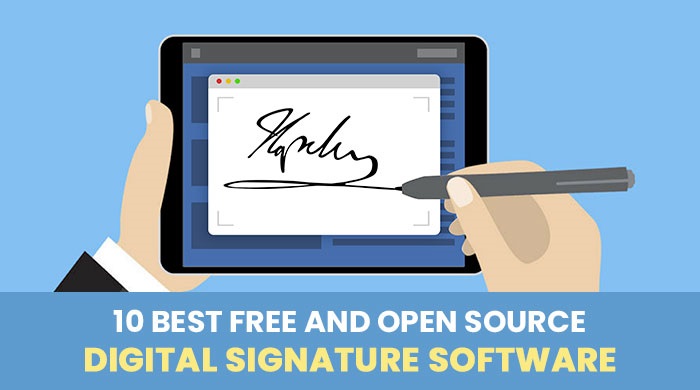When the businesses and everything associated with it moved to a digital pattern, the documents and other associated papers also had to go digital. Gone are the days where people met face-to-face to close a deal or sign a document. Thanks to digital signature technology that is helping us verify and sign all digitally available documents.
The facility allows the users to sign legally online in simple steps rather than going through hard copies and physical signatures. A digital signature is pretty much like a real signature. Instead of signing an actual paper, e signatures can go on a digital document such as a PDF file.
An e-signature system helps sign any document and ensures that the text is not altered in any way and retained as it is. A digital signature adds a digital sequence to an electronic document, which is the same as a handwritten signature on a paper-printed document. In the background, two unique, advanced keys are being used. The keys are called key-pair. The key-pair contains a private key and a public key. Three algorithms work hand in hand to get this working. The first one is an algorithm that generates a key, i.e., select random keys from a list of available private keys and then outputs it along with a public key. The second algorithm signs the message and the private key to generate a signature. The third and the final algorithm verifies the signature using the public key, private key, and the message. All these are interrelated but also work separately. A key pair usually belongs to a particular key holder. The algorithm is so complex that a third party cannot extract it.
In this article, we will discuss the advantages and real-world use-cases of digital signatures, along with few tips that will help you understand its process and how they can work in tandem with business processes to improve the overall business efficiency. Also, you will get a better understanding of some of the best digital signature software currently available.
Advantages of using a digital signature
It is essential to look at some advantages of digital signatures and why it is getting extensively used.
If you send a signed document online without a digital signature in place, it does not validate if someone changes one's document and pretends to be the sender.
A malicious person may illegally copy his signature into his or her document, but the intruder cannot do this in the digital signature. With the right use of digital signatures to sign contracts, there is no need to keep physical copies of signed documents, and this saves a ton of time, money, and even physical storage space.
Imagine the file rooms of any corporate firms or government offices with loads and loads of dusty contracts lying around. With a copy of a securely signed contract saved in the cloud, you can now use all that space to better use. The employee efficiency is enhanced tenfold by eliminating the need for printing, sending it for signing or keeping copies. The transportation costs in couriers are another big saver for companies.
Digital signatures can now be added to any day to day task to make it seamless, for example, signing documents like invoices can be automated by attaching digital signatures directly in the software. Almost all the digital signature providers have an audit log that tracks the activities that happened with the document like who viewed it, who signed it, the time and date it was approved, the device and IP using which it was signed, etc.
Digital signatures also significantly reduce the time taken for deal closures as the agreements reach the inbox in no time, thereby making the parties arrive at a decision fast. This also helps small businesses do efficient business with large enterprises with reduced signature turnaround times.
The Legality of Digital Signatures
Many business owners are so used to signing in the paper that they are really skeptical if signing online on a computer is legally valid. It is. With the Uniform Electronic Transactions Act (UETA) and United States Electronic Signatures in Global and National Commerce (ESIGN) Act, it has gained legality in the United States.
Globally, the nature of the regulations varies from country to country, but it is valid in almost all the major countries in the world. So don't think twice before its adoption.
To enforce legality for an e-signature, it needs to have three key components:
- Integrity- This component should ensure that the data remains the same in both the sender and recipient sources.
- Authenticity- This is to prevent data tampering and cross-checks the source data and destination data is the same as an extra precaution.
- Non-repudiation- This makes sure that the signature source is valid, and a signer cannot deny signing the document.
If your digital signature has all these components, then your contract is valid in all these countries.
Real-world use cases
The e-signature has made some significant impact by improving business process efficiency across a wide variety of streams. The following industries have gained considerably by the introduction of digital signatures for automating manual processes. Once you go through the following use cases, you will have a better understanding of how impactful this is for businesses.
Healthcare
Digital signatures brought out a significant transformation in the healthcare processes by eliminating papers starting from admissions to registrations, and getting consent from patients. E-signs can be easily integrated with electronic health records, thereby reducing the hassle for hospital administrators.
Hospitals primarily will need quicker response time to signatures concerning patients as patient consent is mandatory for several medical procedures, including surgeries. There are digital signature products available in the market that can be used by the medical admins to display consent forms to patients or family from an iPad or a tablet and making them quickly sign by drawing their signature on to it.
The software kicks into action and implements the digital signature. This gets saved with the EHR data and makes life easier for administrators.
Banking
Digital signatures are a boon to banks. Most banks process millions of contracts on a daily basis with a lot of paper trail for their multitude of services. Previously, they had a large number of paper files to manage, and storing these was a big problem. With mobile and internet banking, a bulk of banking services moved online from starting accounts to disbursing loans.
Contracts involving financial transactions needed really robust security to avoid tampering or fraud, and digital signatures came to the rescue. Banks now use digital signatures for account opening, lending, wealth management, mortgages, commercial banking, etc. Digital signatures daily save thousands of hours for executives and administrators who can better focus on serving their customers better.
Reducing paperwork and automation also reduced the chances of documentation errors that cause banks millions of dollars of losses every year on lawsuits.
Human Resources
HR in every organization is very paper-intensive, and it is bound to create clutter after a while and will get on the nerves of your HR team. Imagine, there are 100 people in your organization. Right from onboarding, generating noncompete agreement, documents related to performance reviews, several hundreds of documents will need to be generated and signed by the employees every month. On top of this, there are leave requests, termination, and whatnot.
The adoption of digital signatures has been a big blessing for human resources allowing them to improve employer-employee interactions and attain a competitive edge.
Digital signatures come to the rescue in about 90 percent of the paperwork signing needs in an HR department. The amount of cost saved by this is not a small amount too. Companies can reinvest the saved money in more profitable processes. HR professionals also get a lot of free time, which can be utilized for prospects and processes aimed at making the company future-proof.
Insurance
Insurance has always been an agent-driven business traditionally. Agents meet you, explain the insurance benefits, make you sign service agreements, and the process is done. But companies recently have shifted all these processes online as they couldn't ignore the online channels anymore. And a prerequisite to making you accept or sign contracts online is the digital signature.
This improved the overall customer experience as an insurance purchase could now happen in your laptop or an app in a few clicks and swipes. This also brought down the chances of human errors.
The business process was considerably improved with more business happening online; it meant reduced commissions for agents, and the agents could now be used for other productive tasks.
Legal Services
Legal services have enough paperwork—contracts, notices, government forms, compliance, and so on. Companies operating in legal services spend most of their time working to document, manage, and store it.
The cost involved is not just billable hours of the employees but also the storage space for file rooms, paper costs, printing costs, and a lot more. To get a simple contract signed by a client, legal firms go through many hassles, which may adversely affect the business.
A use case that befits the best for digital signatures is in the legal services industry. With the correct implementation, there is no limit to the process efficiency.
Digital Signature Products
A digital signature is just technology for signing, and a normal user may not be able to get it working without an actual software helping you apply it to real-world scenarios.
There are several digital signature service providers in the market that cater to various industries and processes. The most popular ones are DocuSign and Adobe ESign. There are also other products like HelloSign, PandaDoc, etc. In fact, small businesses and individuals can even think of using free and open source digital signature software.
A simple Google search can give you a lot of product options that you can choose based on your specific use case, budget, and signing needs. All these signing software will have features that are in common.
One of the key elements is to enable you to prepare a document for signing. The software should let you create templates, edit the content, and define where the signature has to be made by each party.
There should be an option to send invitations to the parties requesting signatures. The software should also keep an audit trail of activities happening and the best security to prevent document tampering. Integrations are an important factor to consider while selecting your e-sign software.
Your business workflow might be dependent on a lot of external software and tools like Google and Microsoft services. If the product doesn't provide suitable integrations, then it might become difficult for you to scale up your process later on. Top products in the market, like DocuSign and Adobe E-sign, have API support available that can be used to build custom digital signature applications suited for your business on top of their product infrastructure.
Integrations are handy when you want to build your own automated internal workflows without relying only on the e-sign product features.
Conclusion
Digital signatures are the safest way to execute a contract digitally and have opened up a wide array of opportunities and process improvements for global businesses. It may be even safer than signing on a piece of paper that can easily be destroyed or tampered with.
Also, even though an e-sign is powerful, it may not do much help without coupling it with automation. Businesses need to evaluate themselves and come up with the best process automation workflows that suit them and then link it with signing digitally. A good digital signature software should come of great use to all.
With more and more businesses adopting, let's look forward to a future that can save a lot of trees, time, and money.



